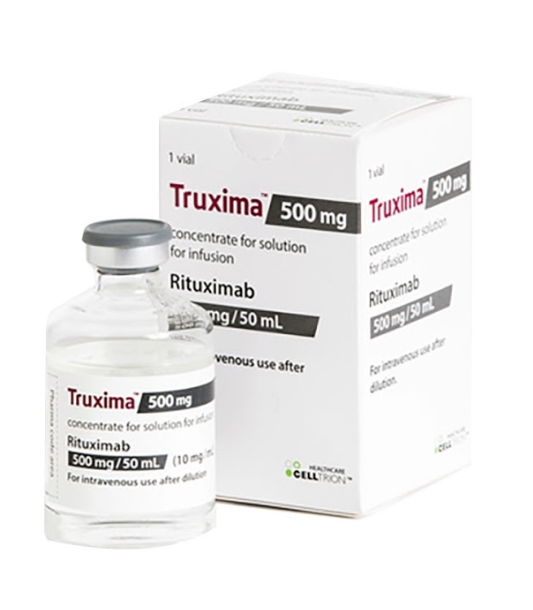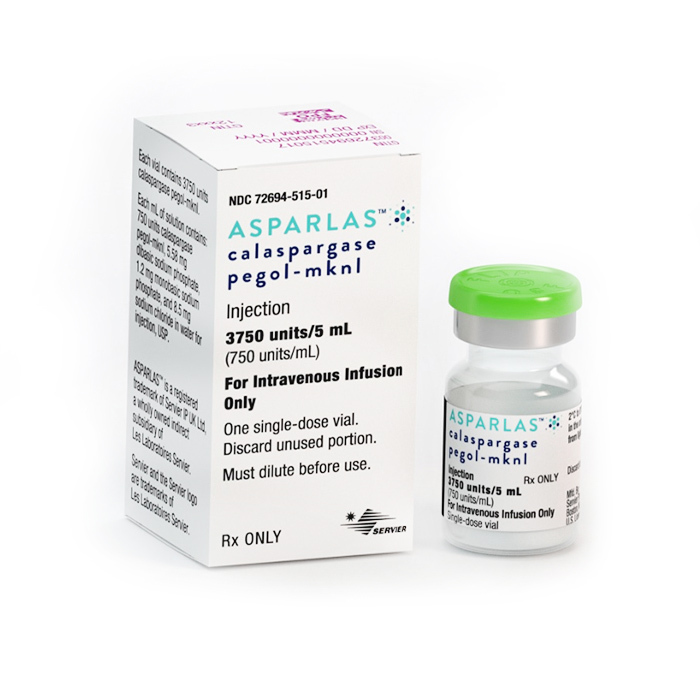Truxima (rituximab) vs Asparlas (calaspargase pegol-mknl)
Truxima (rituximab) vs Asparlas (calaspargase pegol-mknl)
Truxima (rituximab) and Asparlas (calaspargase pegol-mknl) are used to treat different types of conditions; Truxima is a monoclonal antibody used primarily for certain types of blood cancers, such as non-Hodgkin's lymphoma and chronic lymphocytic leukemia, and for autoimmune diseases like rheumatoid arthritis. Asparlas, on the other hand, is a modified enzyme used as part of a multi-drug chemotherapy regimen to treat acute lymphoblastic leukemia (ALL). The choice between Truxima and Asparlas would depend on the specific type and stage of cancer a patient has, and should be made in consultation with an oncologist who can evaluate the individual's medical condition and treatment goals.
Difference between Truxima and Asparlas
| Metric | Truxima (rituximab) | Asparlas (calaspargase pegol-mknl) |
|---|---|---|
| Generic name | Rituximab | Calaspargase pegol-mknl |
| Indications | Non-Hodgkin's lymphoma, chronic lymphocytic leukemia, rheumatoid arthritis, granulomatosis with polyangiitis, microscopic polyangiitis | Acute lymphoblastic leukemia (ALL) as a component of a multi-agent chemotherapeutic regimen |
| Mechanism of action | Targets CD20 antigen on B cells and mediates B cell lysis | Hydrolyzes L-asparagine, which deprives leukemia cells of an essential amino acid for protein synthesis and tumor growth |
| Brand names | Truxima, Rituxan | Asparlas |
| Administrative route | Intravenous infusion | Intravenous infusion |
| Side effects | Infusion reactions, infections, body aches, fatigue, skin rashes | Allergic reactions, elevated liver enzymes, decreased blood clotting, pancreatitis, hyperglycemia |
| Contraindications | Hypersensitivity to rituximab or any component of the formulation | Hypersensitivity to calaspargase pegol, pegaspargase, or any excipients in the formulation |
| Drug class | Monoclonal antibody | Enzyme |
| Manufacturer | Celltrion Healthcare, Teva Pharmaceuticals | Servier Pharmaceuticals |
Efficacy
Truxima (Rituximab) Efficacy in Leukemia
Truxima (rituximab) is a monoclonal antibody that targets the CD20 antigen on the surface of pre-B and mature B lymphocytes. While not primarily indicated for leukemia, its efficacy in certain types of B-cell leukemias, such as chronic lymphocytic leukemia (CLL), has been observed. In CLL, rituximab is often used in combination with chemotherapy. Clinical trials have demonstrated that the addition of rituximab to standard chemotherapy regimens can improve overall survival and progression-free survival in patients with CLL. However, its use may vary depending on the individual patient characteristics and the presence of other health conditions.
Asparlas (Calaspargase Pegol-mknl) Efficacy in Leukemia
Asparlas (calaspargase pegol-mknl) is a modified enzyme used as a component of a multi-agent chemotherapeutic regimen for the treatment of acute lymphoblastic leukemia (ALL). It is specifically indicated for pediatric and young adult patients. Asparlas works by depleting the amino acid asparagine, which leukemia cells require to survive and proliferate. The pegylation of the enzyme extends its circulating half-life, allowing for less frequent dosing compared to other forms of asparaginase. Clinical studies have shown that Asparlas, when used as part of a combination therapy, is effective in achieving a complete remission in patients with ALL and has a safety profile that supports its use in the pediatric population.
Comparative Considerations
When considering the efficacy of Truxima and Asparlas, it is important to recognize that they are used to treat different types of leukemia and are part of distinct treatment regimens. Truxima's efficacy in CLL as part of a combination therapy has been well-established, offering an improved prognosis for many patients. On the other hand, Asparlas has shown efficacy in the treatment of ALL, particularly in younger patients, and is valued for its extended half-life which can improve patient compliance with treatment protocols.
Conclusion
In conclusion, both Truxima and Asparlas have demonstrated efficacy in the treatment of their respective leukemia indications. Truxima has improved outcomes for patients with CLL when used in combination with other chemotherapeutic agents. Asparlas has become an integral part of the treatment regimen for pediatric and young adult patients with ALL, providing sustained asparagine depletion with a dosing schedule that is more manageable for patients. The use of these medications should always be guided by a healthcare professional, taking into account the specific type of leukemia, patient health status, and the overall treatment plan.
Regulatory Agency Approvals
Truxima
-
European Medical Agency (EMA), European Union

-
Food and Drug Administration (FDA), USA

-
Health Canada

-
Therapeutic Goods Administration (TGA), Australia

-
Medsafe (NZ)

Asparlas
-
Food and Drug Administration (FDA), USA

Access Truxima or Asparlas today
If Truxima or Asparlas are not approved or available in your country (e.g. due to supply issues), you can access them via Everyone.org.
How it works

Make an enquiry
Choose the medicine you want to buy, answer a couple of questions, and upload your prescription to speed things up. We’ll get back to you within 24 hours.


Make an enquiry
Choose the medicine you want to buy, answer a couple of questions, and upload your prescription to speed things up. We’ll get back to you within 24 hours.


Breeze through the paperwork
We'll guide you through the required documents for importing unapproved medicine, ensuring you have all the necessary information.


Get a personalized quote
We’ll prepare a quote for you, including medicine costs and any shipping, administrative, or import fees that may apply.


Receive your medicine
Accept the quote and we’ll handle the rest - sourcing and safely delivering your medicine.

Some text on this page has been automatically generated. Speak to your physician before you start a new treatment or medication.
Let's talk
If you have any questions, call us or send us a message through WhatsApp or email:
Contact us




